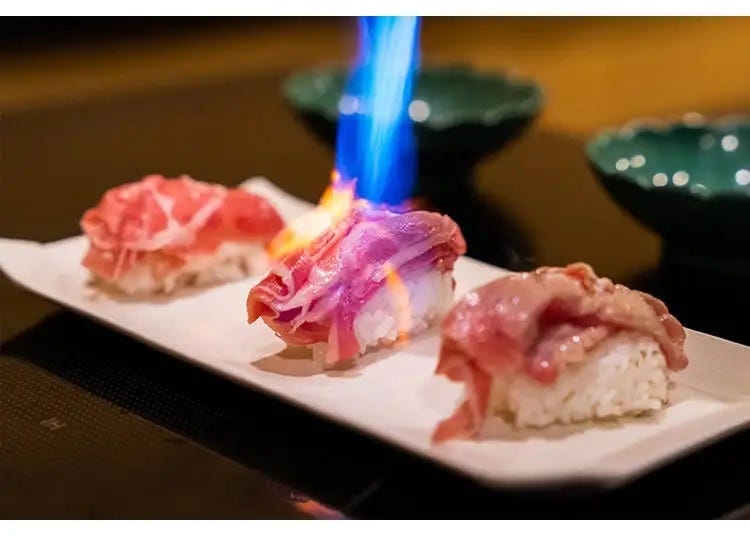
Nestled in an unassuming building, merely a two-minute stroll from the bustling Roppongi Station, lies Kinnome. This eatery serves up a delectable rendition of the renowned Japanese dish, shabu-shabu, infused with Hokkaido’s distinct flavors. But what exactly is shabu-shabu?
Considered the Japanese equivalent of a hot pot, this timeless culinary delight comprises thinly sliced meat and bite-sized vegetables cooked in a large pot of broth. The dish’s name is an onomatopoeic reference to the sound produced by the meat’s swishing motion in the bubbling broth or hot water. Some claim that the meat should only be cooked for the time it takes to utter “shabu-shabu.”
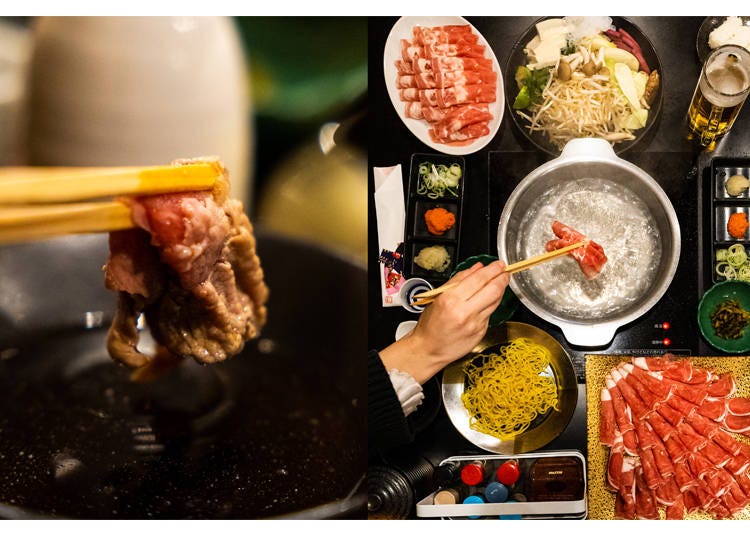
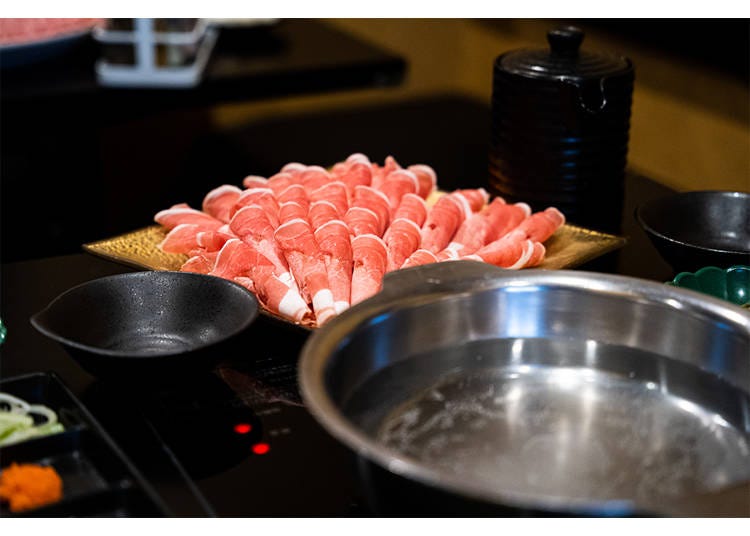
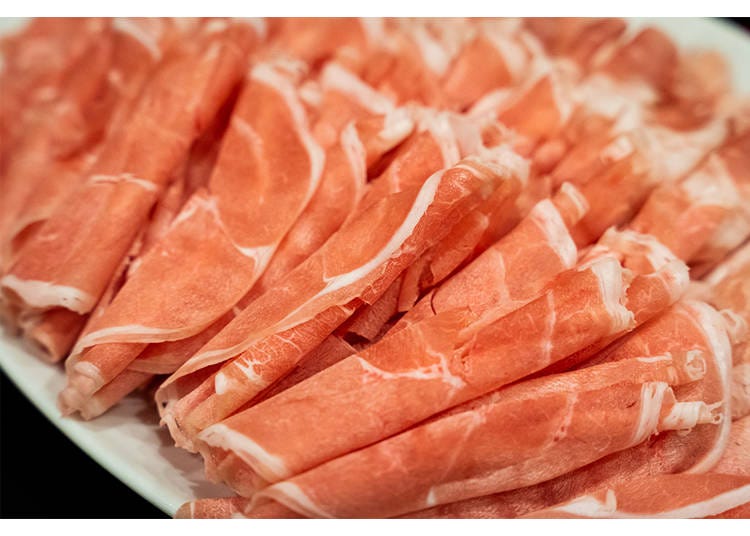
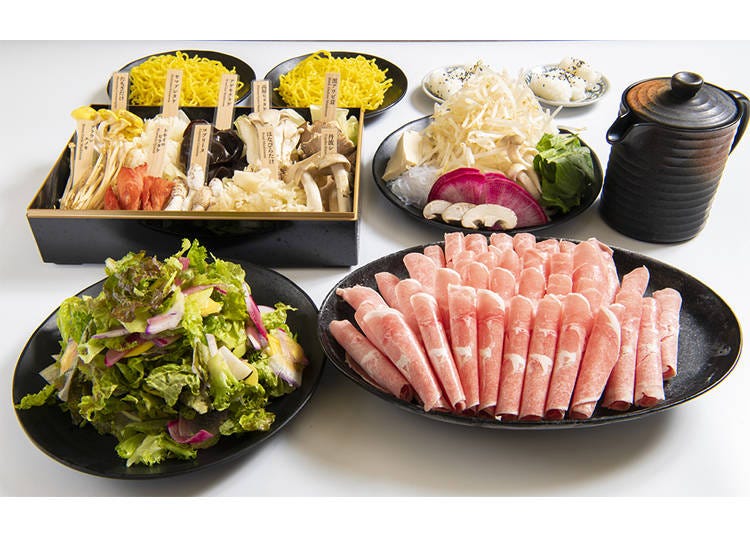
Your meal at Kinnome comes with an array of dipping sauces, each customizable to cater to individual taste buds. Although sesame and ponzu sauce are the most commonly served sauces with shabu-shabu, Kinnome’s innovative take on this dish revolves around a new and exciting twist - lamb! While shabu-shabu is typically prepared using beef, pork, or sometimes seafood, Kinnome’s version tantalizes the taste buds with succulent lamb as the centerpiece.
All you can eat and drink for US$40!?
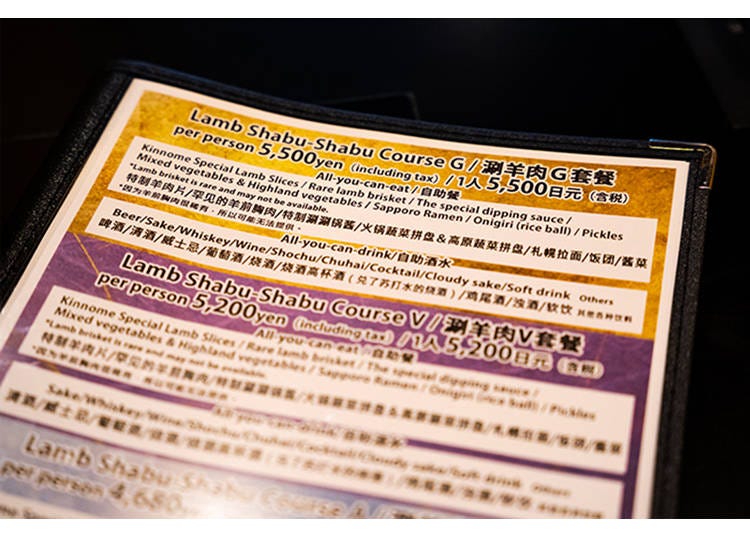
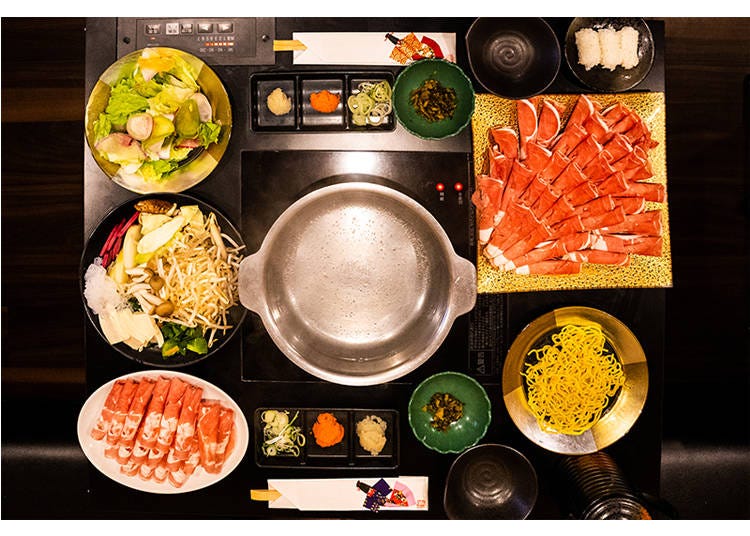

At Kinnome, customer satisfaction is of utmost importance, particularly when it comes to relishing the full experience of lamb shabu-shabu. This is why the restaurant offers an unbeatable all-you-can-eat and all-you-can-drink 2-hour course priced at 5,500 yen, roughly US$40 (as of March 2023). You’d be hard-pressed to find another store in the area that can compete with these prices.
The course not only allows customers to indulge in the restaurant’s top-notch lamb cuts and an assortment of vegetables but also provides a plethora of alcoholic options, including Japanese beer, the milky-white ‘Nigori’ sake, and traditional Japanese sake.
Lamb is leaner than beef and pork so you can eat large portions of it without feeling the uncomfortable bloat. Not only that, but lamb packs a powerful protein punch, making it a great go-to source while savoring every bite.
Besides the shabu-shabu course, Kinnome has also introduced flame-grilled lamb sushi, a tantalizing dish that features the lamb placed on a bed of rice before being blowtorched to perfection. For those who want to try something different, various other course options are available at different price points, ranging from 4,680 yen (around US$35) to a whopping 7,650 yen (around US$60). The restaurant aims to create course menus that cater to all customers, regardless of their budget, so that everyone can savor the exquisite lamb shabu-shabu.
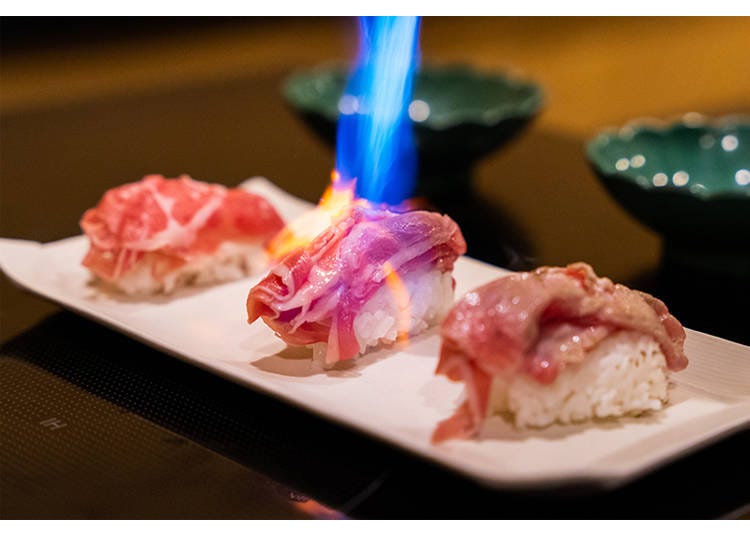
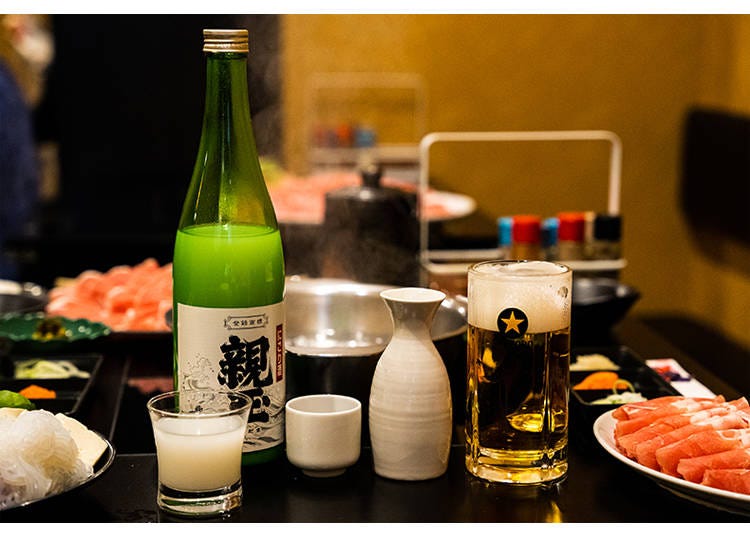
The unique history behind Lamb shabu-shabu
Although lamb meat is a common sight in many countries, it might come as a surprise to some that it is still considered an acquired taste even in Tokyo. While the meat is regularly consumed in the northern prefecture of Hokkaido - the hometown of Kinnome’s owner, Yosuke Tsuru - it remains a rare delicacy in other parts of the country.
Lamb meat has been a part of Hokkaido’s cuisine since the Taisho period (1912-1926), when sheep were primarily raised for their wool to make military uniforms. To encourage sheep ranching in the region, it was crucial to demonstrate to the locals that lamb meat could be enjoyed in various forms.
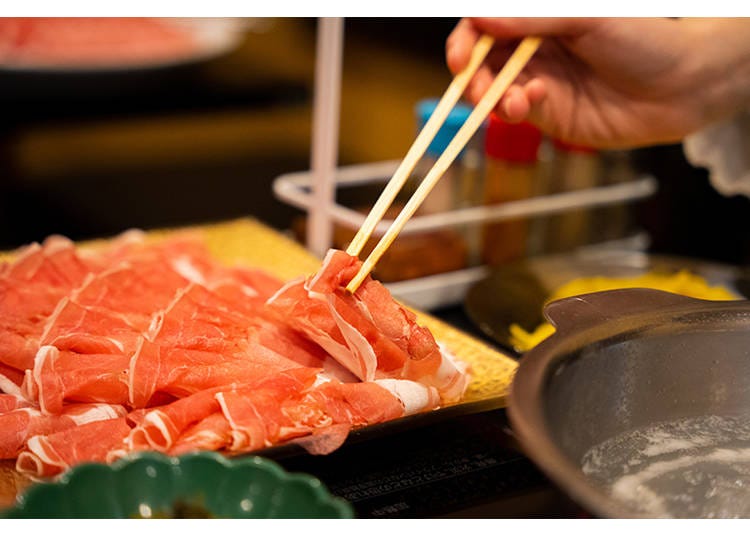
Before this, lamb meat was not widely consumed in Japan, but Hokkaido’s cold climate and vast grasslands provided the ideal conditions for raising sheep. Today, Hokkaido is one of the largest lamb producers in Japan; the meat is a popular ingredient in local cuisine. The unique flavor and texture of Hokkaido lamb are attributed to the region’s climate, as well as the use of traditional farming practices and the high quality of the feed provided to the animals. This is how Hokkaido became one of Japan’s only lamb-rearing prefectures.
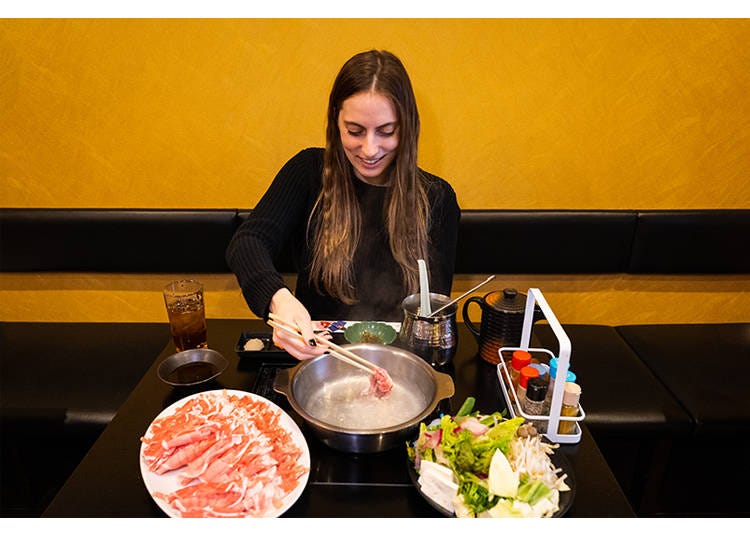
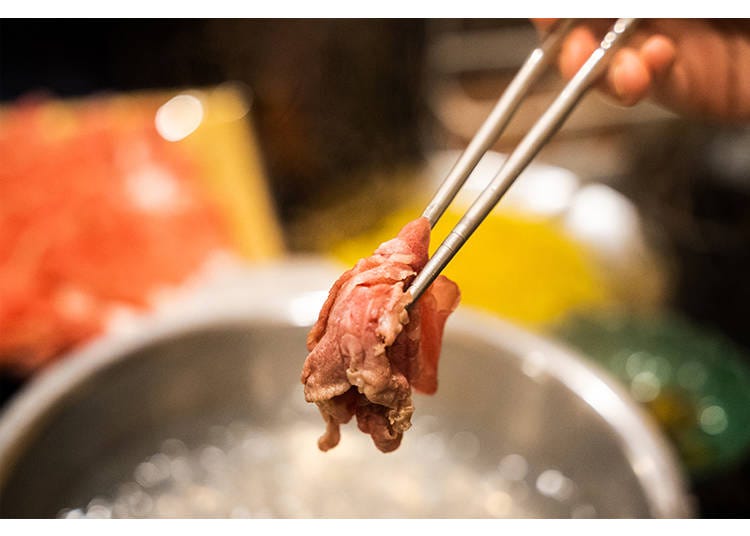
Lamb or mutton has been a staple of Hokkaido’s cuisine for over a century, featuring in a variety of preparations, such as grilling, stewing, skewering, and a traditional dish known as ‘Jingisukan.’ When Kinnome’s owner, Yosuke Tsuru, introduced lamb to Tokyoites, he deemed shabu-shabu as the best option. According to Tsuru, “Lamb tends to be a bit heavy when grilled.”
For those unfamiliar with the meat’s distinct flavors, shabu-shabu presents the ideal way to enjoy it. The lamb’s delicate taste can be relished without being overwhelmed by its typical gaminess, which, in turn, enhances the shabu-shabu experience. With each bite, the stewed vegetables and lamb fat drippings mix with the hot water, resulting in ever-evolving flavors.
To ensure that the lamb is cooked to perfection, only select cuts that are thin enough to be boiled rapidly are used. Moreover, the meat must be “so fresh that it can be eaten raw.” This is critical since flash-boiling the meat is a crucial step in preparing shabu-shabu. Some customers even prefer their lamb to be slightly rare when consumed.
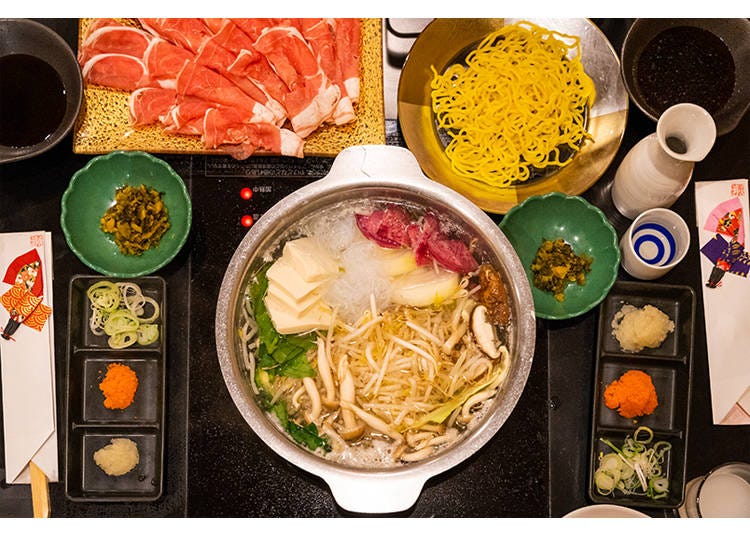
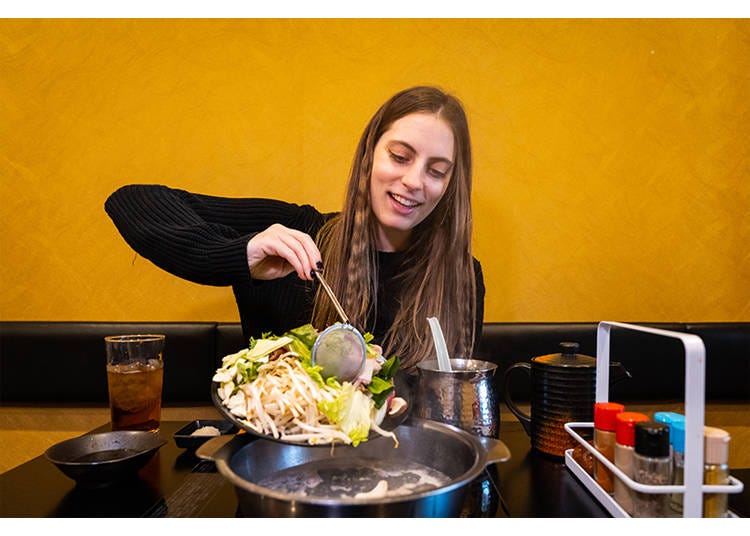
To savor Kinnome’s signature lamb shabu-shabu, begin by heating your pot of water to a simmer. Once the water reaches the desired temperature, add your preferred vegetables and let them stew for a while before adding the thinly sliced lamb. Kinnome adopts a unique approach to its broth, using only hot water as the base to allow the natural umami flavors of the lamb and other ingredients to shine. Although unconventional, this method results in a scrumptious dish that satisfies your taste buds.
Next, take the lamb slices and swish them around in the pot for a few seconds until the color starts to change. As previously mentioned, the meat only requires a brief cooking time of a few seconds. Once the lamb and vegetables are cooked, remove them from the broth and dip them into Kinnome’s secret sauce to add an extra burst of flavor.
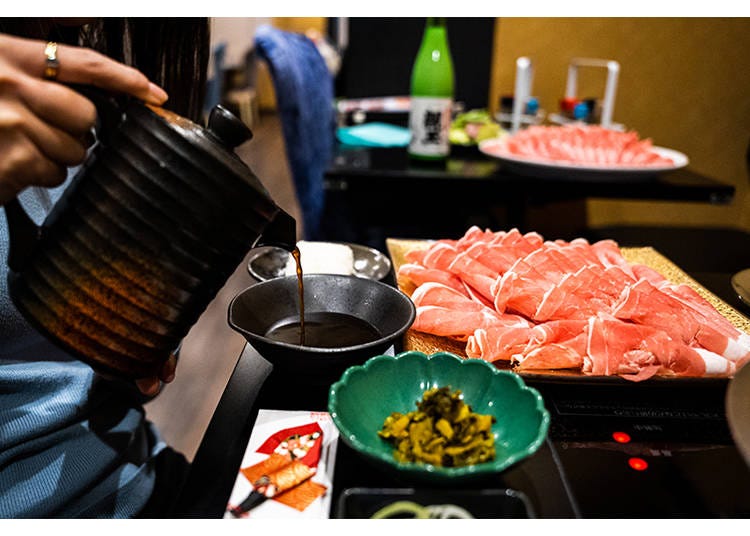
Kinnome’s sauce is a blend of 20 different fruits and vegetables, soy sauce, mirin, and Japanese cooking sake, aged for approximately six months to develop its unique flavor. This delectable sauce is the perfect accompaniment to lamb shabu-shabu, with its well-balanced taste that blends perfectly with the meat and vegetables on the table.
Each component of the dish is delicious on its own, but combining them together enhances the flavors even further. According to the owner, the best way to eat lamb shabu-shabu is by layering the lamb and vegetables together to create what he calls the “lamb shabu millefeuille.” The result is a mouthwatering dish that you won’t be able to resist.
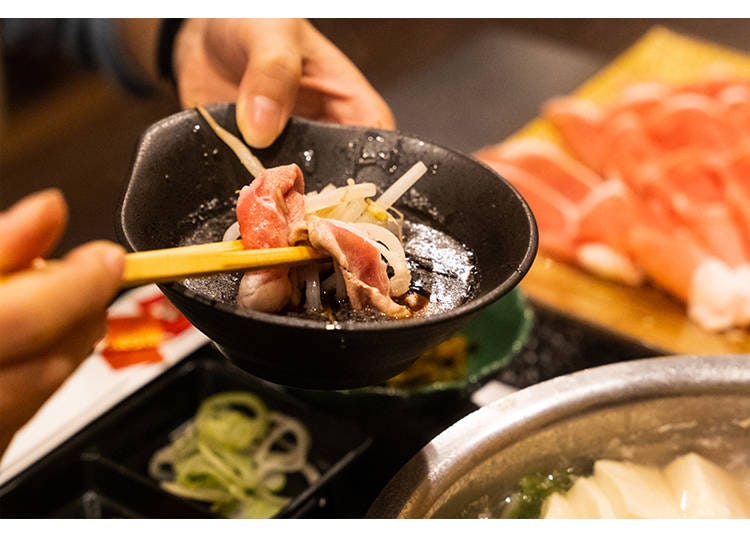
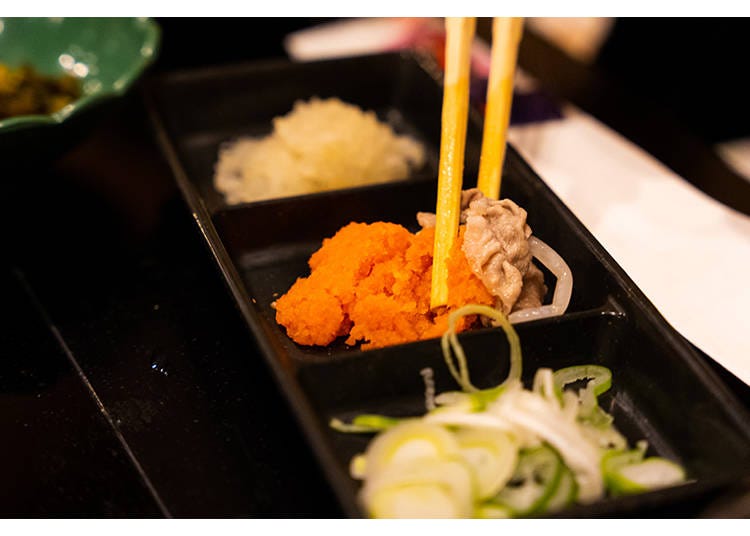
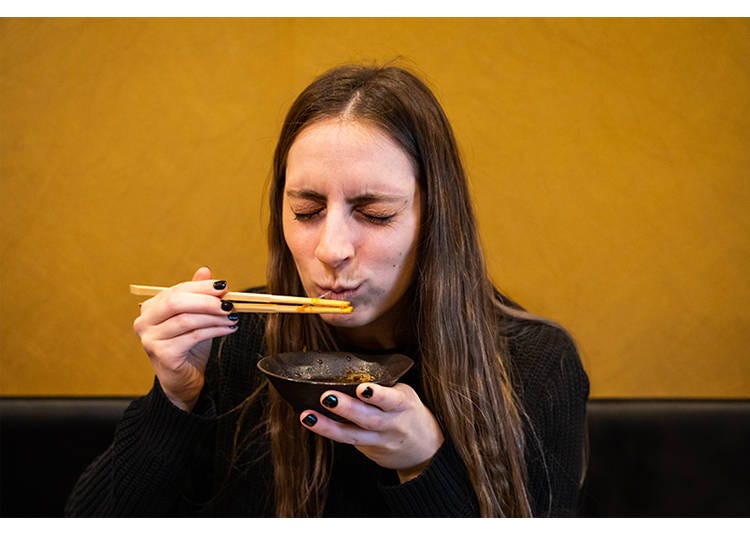
Those who want to customize the sauce’s flavor can add ‘Yakumi,’ a term used to refer to fruits, vegetables, or dried seafood that are added while cooking to enhance the dish’s flavor or add a pleasant aroma. The restaurant offers grated onion, garlic, and a spicy grated mixture for those who prefer a little extra kick.
At the end of the meal, add Kinnome’s special Hokkaido egg ramen noodles to the remaining broth. These noodles absorb the broth’s rich flavor, and the Hokkaido eggs infuse it with a hint of sweetness, making for a perfect conclusion to your dining experience. Make sure to relish the broth, which has now absorbed all the intricate flavors of the ingredients.
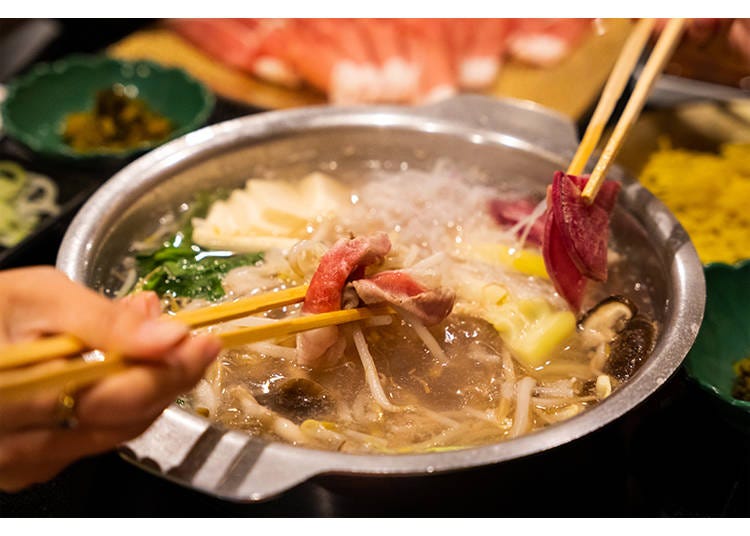
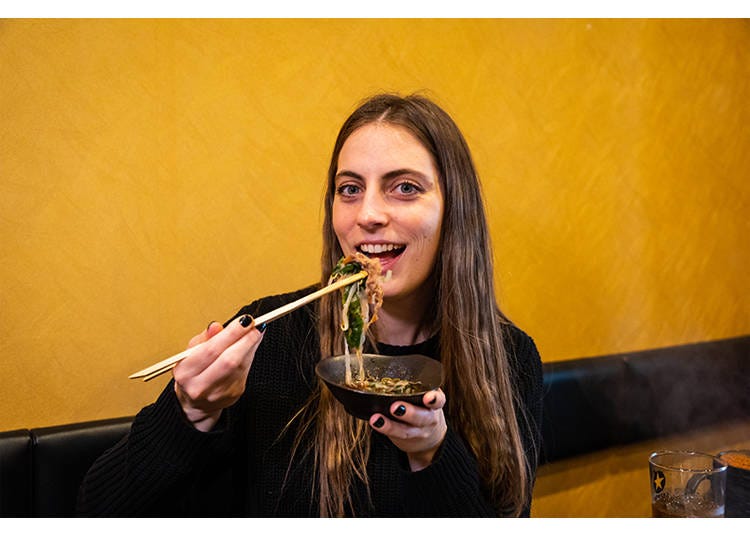
Kinnome’s take on shabu-shabu not only tantalizes your taste buds but also provides a healthier dining option. By eliminating the added salt and seasonings present in a traditional broth, the natural flavors of the lamb and vegetables shine through, making for a more nutritious and flavorful meal. You’ll be surprised at just how satisfying and delectable this simple approach to shabu-shabu can be.
For an even more enhanced flavor profile, don’t miss the mushroom lamb shabu-shabu course! The addition of mushrooms layers the broth’s flavor, elevating your dining experience to new heights.
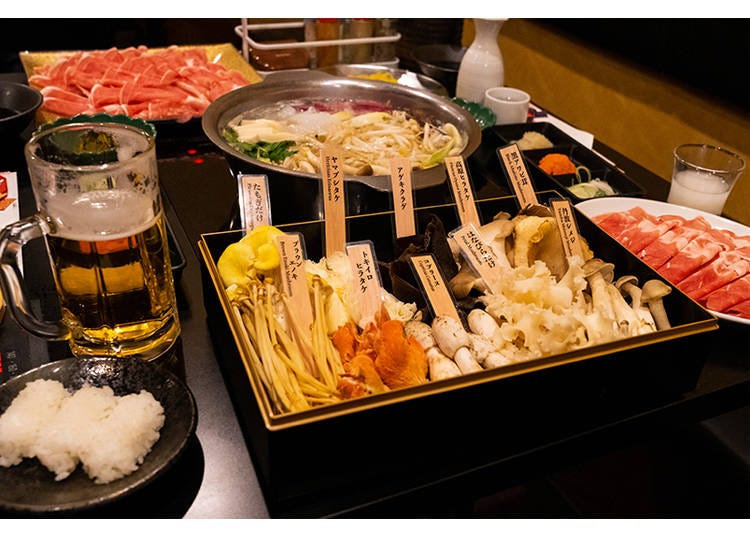
Lamb shabu-shabu is an exceptional dish that you simply must try at least once in your lifetime. As traditional shabu-shabu in Japan commonly features beef or pork, those with dietary restrictions may be unable to savor this delectable cuisine. However, with the increasing popularity of lamb shabu-shabu, everyone can now relish this scrumptious meal at Kinnome.
A communal meal for family or friends
The interactive and communal aspect of lamb shabu-shabu is undoubtedly one of its most appealing features. Typically shared with family or friends, everyone participates in the cooking process by individually dipping their meat into the broth and selecting their desired vegetables. This fosters a lively and engaging dining experience that brings people closer together.
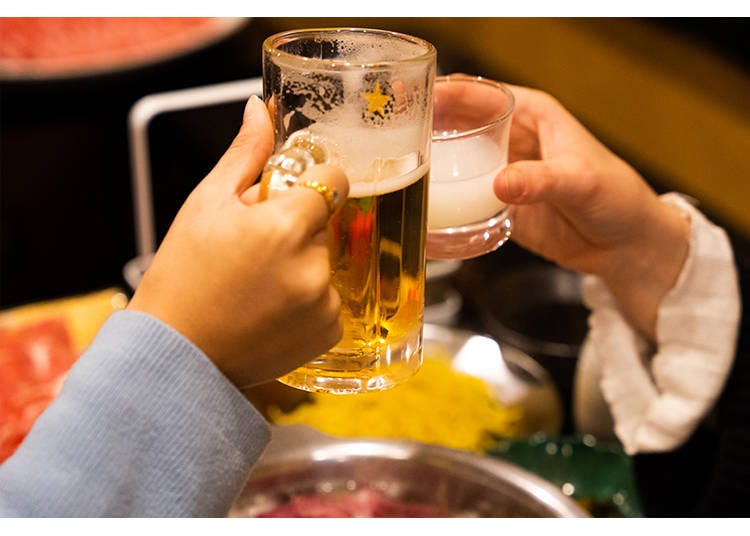


At Kinnome, you don’t need to worry about any language barriers! Each table has a smart tablet offering English options, making ordering food and drinks as smooth and hassle-free as possible. So, sit back, relax, and enjoy a delightful meal with friends and family without any worries!
Aside from its delightful flavor and communal feel, lamb shabu-shabu is also an exceptionally healthy meal. It is low in calories and abundant in vital nutrients like protein, vitamins, and minerals. Since Kinnome doesn’t require reservations, be sure to add this Roppongi restaurant to your itinerary during your next trip to Japan or if you’re looking for a delicious meal in Tokyo. This nourishing and flavorful dish, coupled with the interactive and communal dining experience, is bound to be a memorable highlight of your trip.
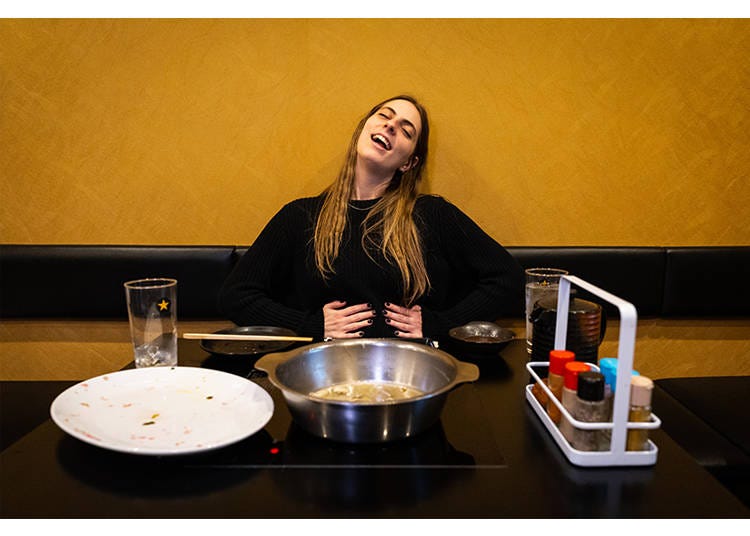
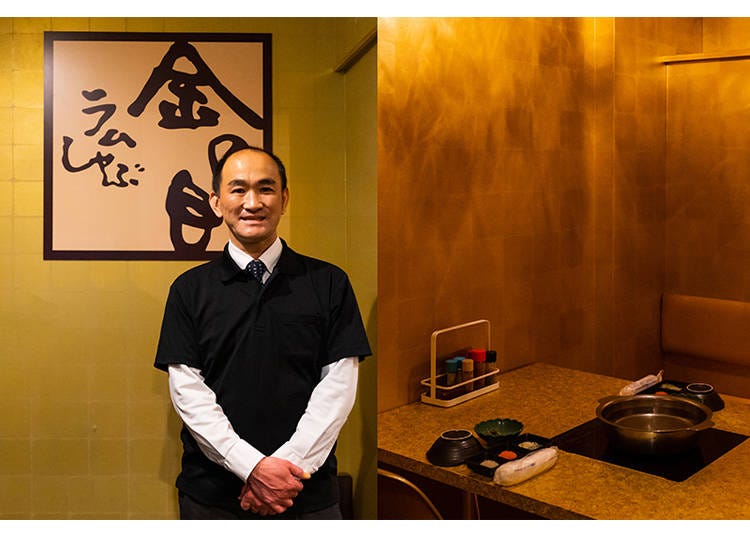
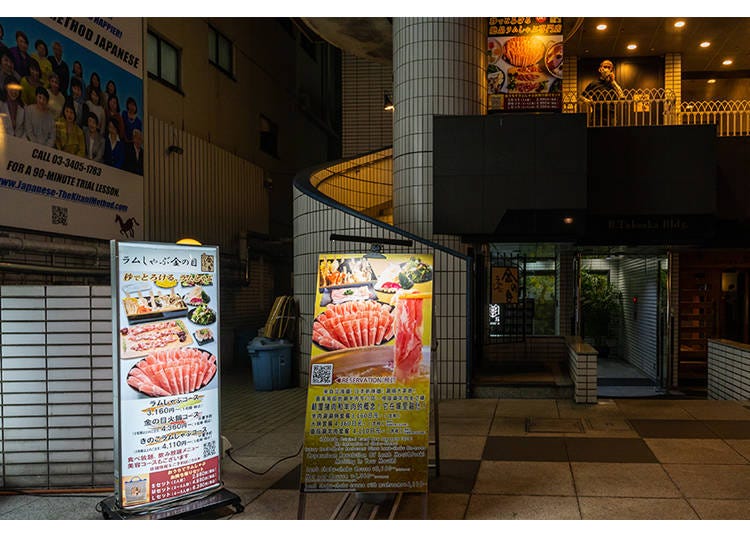
Whether you’re already a fan of lamb or just seeking to explore new culinary horizons, shabu-shabu is a quintessential Japanese dish that you simply must try. The unconventional hot water approach adopted by Kinnome in Roppongi enhances the already delightful flavors of this dish. The next time you’re in Tokyo, gather your loved ones, prepare a pot of broth, and indulge in this timeless Japanese delicacy. Trust us, you won’t be disappointed!
-
 Has Health & Safety Measures
Has Health & Safety Measures-
Address
Takeoka Building 2F,4-12-11, Roppongi, Minato-ku, Tokyo, 106-0032
View Map -
Nearest Station
Roppongi Station (Tokyo Metro Hibiya Line / Toei Oedo Line)
- Phone Number 03-6447-1894
-
Address
Takeoka Building 2F,4-12-11, Roppongi, Minato-ku, Tokyo, 106-0032
- Area
- Category
*Prices and options mentioned are subject to change.
*Unless stated otherwise, all prices include tax.
Popular Tours & Activitiess
-

Tokyo City Pass Upgrade: Harry Potter Studio Tour & Top Sights up to 85% Off
by: Guest Contributor
-
Ad

(Opening in Jan 2026) 'THE SUMO LIVE RESTAURANT HIRAKUZA GINZA TOKYO!' 5 Exciting Ways to Experience the World of Sumo!
-

Keisei × Keikyu 16-Temple Goshuin Tour: Discover Deeper Tokyo & Yokohama
by: Guest Contributor
-

[Extended Offer!](12% OFF KKday Coupon) Mt. Fuji Autumn Leaves, Powder Snow & More! 15 Best Tours to Experience Japan in Fall & Winter
-
Ad

Preserving the Beauty of World Heritage Site Shirakawa-go for the Future Through Responsible Travel
-

The Best Japanese Food Representing 2025! 'Dish of the Year®' Annual Award Results Announced
Inspiration for Accommodations
-

Enjoy Mt. Fuji from the Comfort of Your Room! Recommended Ryokan with Mt. Fuji View
-

Stay Near the Cherry Blossoms! Hotels for Cherry Blossom Viewing in Tokyo
-

Family-Friendly Hotels with Free Shuttle to Disneyland: Convenient Access for a Magical Stay
-

Top Ranked Hakone Hotels with Mt. Fuji View: Enjoy Stunning Scenery from Your Private Space
-

Convenient Tokyo Hotels with Airport Shuttle: Ideal for Families and Heavy Luggage
-

Stunning Tokyo Tower View Hotels: Enjoy Spectacular Scenery from Your Private Space
-

Convenient Asakusa Hotels with Kitchens: Ideal for Extended Family Visits
-

Experience Luxury: Hakone's 10 Best Five-Star Accommodations
-

Enjoy Mt. Fuji Autumn Leaves! Top Hotels Near the Popular Autumn Leaves Corridor
-

Experience Hakone Fall Foliage from Your Room with Stunning Views
-

Tokyo Train Map: Your Essential Guide to Subways and Railways
-

The Best of Japan: 11 Major Cities Every Traveler Should Visit
-

Essential Tokyo: The Complete Guide to Ikebukuro Station
-

Rabu Ginza Glasse: Savoring High-Grade Pork Shabu-Shabu
-

10 Important Japanese Phrases to Know Before You Enter a Japanese Convenience Store!
by: Teni Wada
-

Tajima-ya Yodobashi AKIBA: Incredible Beef Shabu-Shabu in Akihabara - And It’s All-You-Can-Eat!
by: Naho Jishikyu
- #best ramen tokyo
- #what to buy in ameyoko
- #what to bring to japan
- #new years in tokyo
- #best izakaya shinjuku
- #things to do tokyo
- #japanese nail trends
- #what to do in odaiba
- #onsen tattoo friendly tokyo
- #daiso
- #best sushi ginza
- #japanese convenience store snacks
- #best yakiniku shibuya
- #japanese fashion culture
- #best japanese soft drinks












